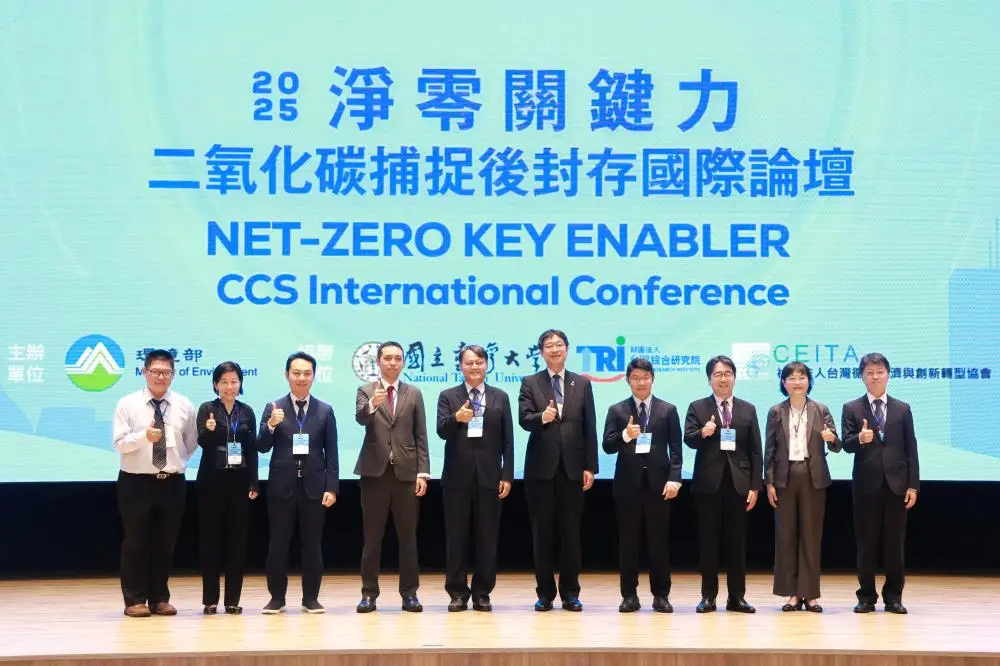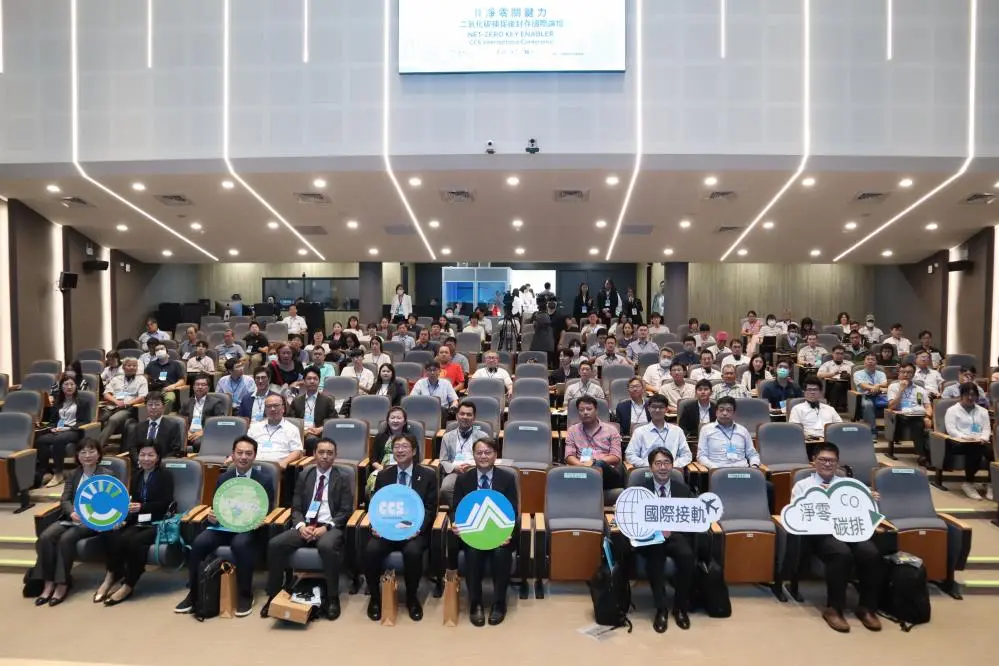Taiwan–Japan Collaboration Boosts Net-Zero Momentum as CCS International Forum Concludes Successfully
Taiwan–Japan Collaboration Boosts Net-Zero Momentum as CCS International Forum Concludes Successfully

To accelerate Taiwan's transition toward net zero, the Ministry of Environment (MOENV) today (Oct. 8) hosted the "Net-Zero Enabler—Carbon Dioxide Capture and Storage (CCS) International Conference", bringing together experts from industry, government, and academia in Taiwan and Japan. The forum facilitated in-depth discussions on national CCS strategies, emerging technologies, and public engagement, with the goal of charting Taiwan's path toward carbon storage development and driving progress toward the 2050 net-zero emission target.
During his remarks, Deputy Minister Yein-Rui Hsieh of the MOENV emphasized that CCUS (Carbon Capture, Utilization, and Storage) is a critical technology in Taiwan's 2050 net-zero emission pathway, with a target of contributing 6 million tons of CO₂ reduction by 2035. Given the similarities in geological conditions and industrial structures between Taiwan and Japan, Japan's CCS development experience is highly valuable as a reference.
Regarding this, Kawai Gen, Deputy Representative of the Japan-Taiwan Exchange Association, noted that Japan's coastal regions have a carbon storage potential of 150–240 billion tons. The Japanese government passed the CCS Business Act in 2024 to regulate storage permits and transportation mechanisms and launched nine "Advanced CCS Plans" to build a comprehensive industrial value chain. He expressed hope that experts from both Japan and Taiwan will continue to deepen exchanges and jointly advance sustainability.
Japan's Experience: From National Strategy to Advanced Technologies
Dr. Kunieda from the Japan Organization for Metals and Energy Security (JOGMEC) shared that Japan's CCS strategic targets aim to store 6–12 million tons of CO₂ annually by 2030, increasing to 120–240 million tons by 2050. To achieve this, JOGMEC has selected nine "Advanced CCS Plans" as commercial demonstration models and is actively promoting cross-border CO₂ transport cooperation with countries such as Malaysia and Singapore.
Meanwhile, Professor Takeshi Tsuji from the University of Tokyo highlighted that safety and public trust are the foundations for achieving CCS goals. He introduced innovative, low-cost monitoring technologies, including portable active seismic sources and distributed acoustic sensing, which enable precise tracking of CO₂ underground dynamics and ensure geological stability.
Taiwan's Strategic Blueprint: Building a Complete Value Chain through Public-Private Collaboration
Yi-Chia Chen, Director of the Climate Change Administration, Ministry of Environment, explained that Taiwan's CCUS Flagship Action Plan will advance through four key dimensions—legal framework, industry, technology, and finance—via cross-ministerial collaboration. To meet Taiwan's 2035 reduction target under NDC 3.0, CCS is regarded as an essential pillar. The MOENV is currently drafting CCS management regulations under the Climate Change Response Act to govern site applications and storage operations, while also conducting a strategic environmental assessment (SEA) to guide future project-level evaluations.
Professor Bieng-Zih Hsieh of National Cheng Kung University noted that achieving Taiwan's 2035 target will be challenging but feasible through four strategic approaches: raising public awareness, establishing infrastructure hubs, offering economic incentives, and strengthening legal frameworks. Professor Ming-Long Liu of National Taiwan University described CCS as the "final piece" in Taiwan's net-zero puzzle, recommending six key actions: accelerating regulatory development, addressing seismic concerns, establishing a full value chain, creating financial support mechanisms, forming a CCS-focused company modeled after Japan's JCCS, and enhancing public communication and engagement.

Technical Implementation and Public Engagement: Building Trust in Safe Carbon Storage
Daiji Tanase, Director at Japan CCS Co., Ltd., shared insights from Japan's Tomakomai CCS Project, which successfully achieved its 300,000-ton injection target. Following the 2018 Hokkaido earthquake, scientific monitoring data confirmed no leakage or operational risks, earning strong public confidence in the project's safety. Ryosuke Sato, Special Investigator at JOGMEC, elaborated on Japan's Advanced CCS Projects, addressing the challenges of pipeline and maritime CO₂ transport. He highlighted the establishment of the Joint Forum on Liquefied CO₂ Shipping Value Chain Standards, where over 30 companies collaborate to develop a hub-and-cluster model aimed at reducing costs and sharing risks.
On Taiwan's side, Professor Tien-Shun Lin of National Central University noted that the western region of Taiwan holds an estimated 40 billion tons of theoretical CO₂ storage potential, with pilot sites planned in Guanyin, Tiezhen Mountain, Taichung, and Mailiao. Professor Ya-Hsuan Liou of National Taiwan University analyzed global regulatory trends, observing that leading nations such as the UK, the US, and Japan have adopted government-led, stringent regulatory systems. She recommended that Taiwan establish a comprehensive legal framework covering site selection, exploration, injection, and monitoring to ensure environmental integrity and long-term safety.
Looking Ahead: Strengthening International Cooperation Toward Net-Zero Goals
The forum concluded with a dialogue among domestic and international experts, focusing on regulatory integrity, financial support, capture and monitoring technologies, Taiwan's strategic planning, and public communication. These discussions offered valuable insights for shaping Taiwan's CCS development strategy and reinforcing public trust as the nation advances its net-zero transition.
Going forward, the MOENV will continue to enhance international collaboration and dialogue, while building a comprehensive regulatory and management framework to ensure the safe and steady deployment of CCS technologies in Taiwan—establishing a vital foundation for achieving the country's net-zero ambitions.
